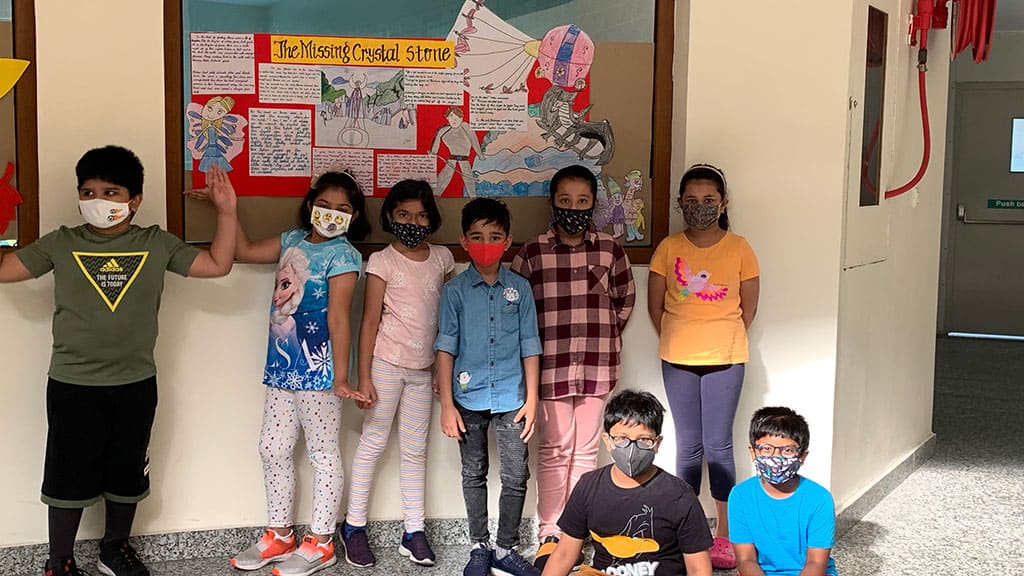A story first
Mahatma Gandhi once lost a sandal on the train tracks. Unable to retrieve it because the train was in motion, he tossed his remaining sandal next to the lost one. One sandal did him no good, but an abandoned pair might have great value for someone else. David Perkins narrates this story in his recent book, Future Wise: Educating Our Children for a Changing World. He argues that Gandhi demonstrated “big understanding” in this moment of insight and took action to advance an ethical outcome, as Perkins puts it.

“Mahatma Gandhi” by Vinoth Chandar, licensed under CC BY 2.0
The case for Social and Emotional Learning (SEL) in school
The Collaborative for Academic, Social, and Emotional Learning (CASEL) defines Social and Emotional Learning (SEL) as the process through which all young people and adults acquire and apply the knowledge, skills, and attitudes to develop healthy identities, manage emotions and achieve personal and collective goals, feel and show empathy for others, establish and maintain supportive relationships, and make responsible and caring decisions.
Perkins’ anecdote alludes to many of the facets of personality and character embodied in CASEL’s definition. In his book, Perkins introduces the terms ‘lifeworthy learning’ and makes a convincing case for why students learn a discipline’s content and ways of thinking in unison. He further says that students need to develop empathic abilities and ethical understanding to become productive citizens of the world today.
What global studies tell us
There is compelling evidence from various credible sources pointing towards the absolute need to intentionally teach social and emotional skills to young people in schools. Let us examine three of them here.

“Emotions” by Tinomen on Flickr licensed under CC
- OECD Survey of social and emotional skills among 10 and 15-year olds
The first results from the most comprehensive international effort to collect reports from students, parents and teachers on the social and emotional skills of learners at age 10 and 15 states that social and emotional skills are not just essential in their own right but are also significant predictors of school grades across age cohorts, subjects, and cities. Being intellectually curious and persistent are the social and emotional skills most strongly related to school grades for both 10 and 15 year-olds in reading, mathematics and the arts. Results from the survey also suggest that improving social and emotional skills could be a way to help students enjoy better social relations in school and vice versa.Source: OECD (2021), Beyond Academic Learning: First Results from the Survey of Social and Emotional Skills, OECD Publishing, Paris, https://doi.org/10.1787/92a11084-en. - Impact study of promoting student wellbeing on student academic and non-academic outcomes by Dr Ariel Lindorff, Department of Education, University of Oxford
The report makes an interesting observation. Beyond direct relationships between well-being and academic attainment, it is also relevant to consider possible trade-offs and tensions from implementing strategies to promote well-being and academic attainment. For example, increased parental achievement pressure, homework and hours of instruction may increase achievement while decreasing pupil happiness, satisfaction with school and the quality of teacher-pupil relationships. Therefore, schools may need to carefully consider what tensions may exist between different goals and initiatives. This will help navigate and mitigate such potential trade-offs between well-being and academic attainment.Source: https://oxfordimpact.oup.com/wp-content/uploads/2020/10/Wellbeing-Impact-Study-Report.pdf - Phi Delta Kappan journal article by Rebecca Bailey, Laura Stickle, Gretchen Brion-Meisels, and Stephanie M. Jones.
The article presents three key findings from the implementation of a strategy-based SEL approach.- Implementing SEL in schools should be organised around a model that identifies necessary age-appropriate skills. The SEL skills taught in classes should change and evolve as students get older.
- SEL should focus on flexible, low-lift strategies and practices. Students can practice SEL in various contexts, settings, and times of the day.
- The most effective SEL strategies respond to individual student needs and reflect their experiences in school and at home.
Source: Bailey, R., Stickle, L., Brion-Meisels, G. & Jones, S.M. (2019). Re-imagining social-emotional learning: Findings from a strategy-based approach. Phi Delta Kappan, 100 (5), 53-58.
SEL and Sancta Maria

Sancta Maria students pose against the backdrop of their group story project
Last year, we introduced school-wide SEL lessons using the CASEL framework. We decided to teach the skills independently first before implementing an integrated approach. We have undertaken an evaluation study to determine the early impact of SEL sessions on high schoolers. As part of this exercise, 62 high school students completed a survey to share their feedback on the impact of SEL sessions.
The key findings of the survey are encouraging. On a scale of 1 to 10, with 10 being extremely high,
- 74% of respondents rated the quality of the student-facilitator relationship between 8 to 10.
- 61.3% of respondents rated their interest in attending SEL sessions between 8 to 10.
- 76% of respondents rated opportunities provided by the facilitator to share views and experiences between 8 to 10.
We will share the evaluation report in the due course of time. We believe we’ve taken baby steps at Sancta Maria for SEL, but we are making good progress in the right direction. One of our commitments to fulfil our vision of unlocking every learner’s potential is to take concrete measures to promote our students and staff’s physical, emotional, social, and mental well-being. The following student quote from the survey is our lighthouse to keep us moving forward on this journey.
“SEL sessions have helped me a lot as these sessions made me realise and understand my surroundings and emotions better. Confidence was not my strong suit, but these sessions are helping me build that, thanks to the facilitator.”
Some resources for parents:
https://casel.org/systemic-implementation/sel-with-families-caregivers/
https://johnbrownpraxisgroup.medium.com/why-social-emotional-learning-matters-b1697b543e04
https://growinggreatschoolsworldwide.com/if-only-why-social-emotional-learning-matters-so-much/

